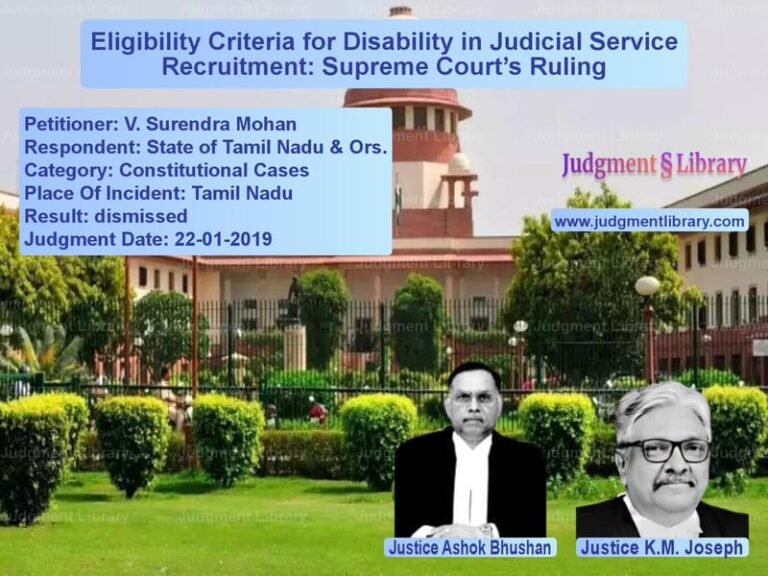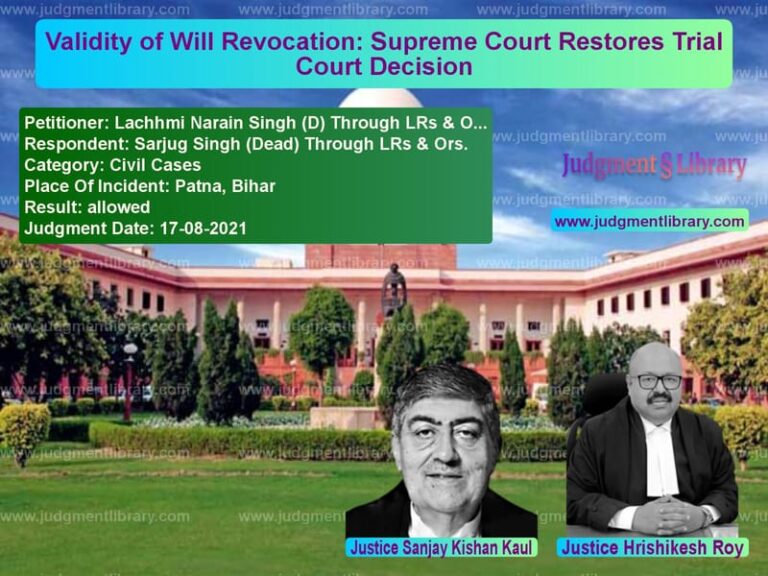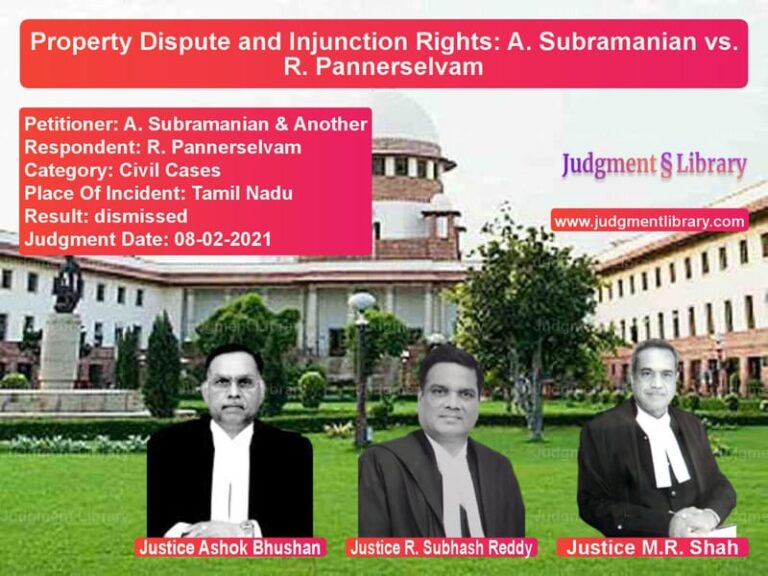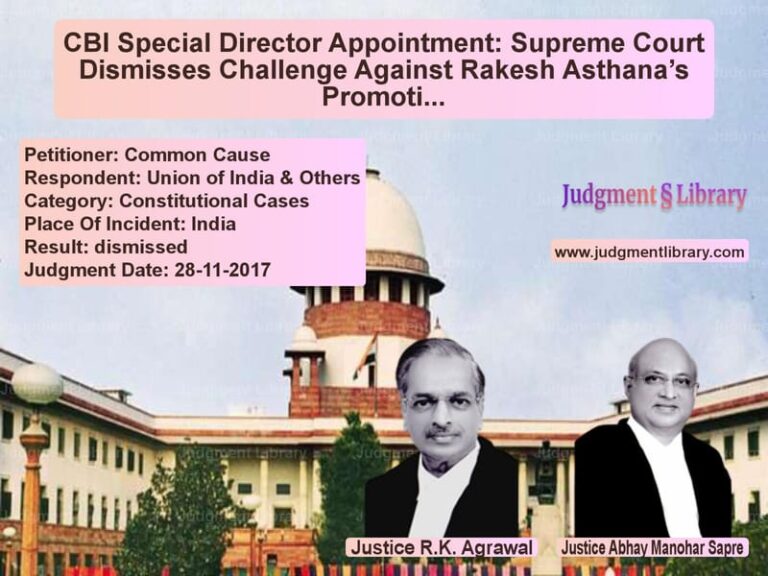Supreme Court Upholds Retrospective Gratuity for Private School Teachers
The Supreme Court of India recently delivered a landmark judgment in the case of Independent Schools’ Federation of India (Regd.) vs. Union of India & Another, addressing a long-standing dispute over the payment of gratuity to teachers in private educational institutions. The judgment, delivered on August 29, 2022, by a bench comprising Hon’ble Mr. Justice Sanjiv Khanna and Hon’ble Ms. Justice Bela M. Trivedi, reaffirmed the constitutional validity of amendments made to the Payment of Gratuity Act, 1972, which extended gratuity benefits to private school teachers with retrospective effect from April 3, 1997.
The ruling is significant as it settles a legal battle that had been ongoing for years, with private schools contesting their obligation to pay gratuity to teachers. The Court upheld the amendments and dismissed all appeals challenging the retrospective application of the Payment of Gratuity (Amendment) Act, 2009.
Background of the Case
The Payment of Gratuity Act, 1972, was originally enacted to ensure terminal benefits for employees in various establishments, including factories, mines, plantations, ports, and shops. However, its application to educational institutions remained ambiguous. In 1997, the Government of India issued a notification extending the Act to cover educational institutions with ten or more employees. This meant that teachers in private schools would also be entitled to gratuity. However, the legality of this inclusion was challenged in courts, leading to conflicting judgments from various High Courts.
Read also: https://judgmentlibrary.com/supreme-court-dismisses-review-petition-in-property-dispute-case/
In Ahmedabad Private Primary Teachers’ Association v. Administrative Officer & Others (2004), the Supreme Court ruled that teachers did not fall within the definition of “employees” under Section 2(e) of the Payment of Gratuity Act, 1972, as they were not engaged in manual, technical, or clerical work. This decision effectively excluded teachers from receiving gratuity benefits.
To rectify this, the Parliament enacted the Payment of Gratuity (Amendment) Act, 2009, which redefined “employee” to include teachers. The amendment was given retrospective effect from April 3, 1997, the date on which the notification bringing educational institutions under the Act was issued. Several private schools challenged the amendment, arguing that it imposed an undue financial burden on them.
Arguments by the Petitioners
The petitioners, mainly associations representing private schools, raised the following key arguments against the amendment:
- The retrospective nature of the amendment was arbitrary and unreasonable, as it imposed a financial liability on private schools for past periods.
- The amendment violated the doctrine of separation of powers by legislatively overruling the Supreme Court’s decision in Ahmedabad Private Primary Teachers’ Association.
- Private schools had not collected funds for gratuity payments before 2009, and requiring them to make retrospective payments was unfair.
- The amendment violated Articles 14, 19(1)(g), 21, and 300-A of the Constitution of India, as it deprived private schools of their right to manage finances without prior warning.
Arguments by the Respondents
The Union of India defended the amendment on the following grounds:
- The amendment merely corrected a legislative anomaly that had previously excluded teachers from receiving gratuity.
- The retrospective effect was necessary to ensure that teachers who had served since 1997 were not unfairly denied their rightful benefits.
- The financial impact on private schools was minimal compared to the fundamental right of teachers to receive terminal benefits.
- The amendment was based on the recommendation of the Standing Committee, which had concluded that denying gratuity to teachers was an unfair technical flaw.
Key Observations by the Supreme Court
The Supreme Court, after analyzing the legislative intent and legal precedents, made the following key observations:
“The amendment was necessary to ensure that teachers receive the same gratuity benefits as other employees in private educational institutions. Denying them gratuity would amount to unfair discrimination.”
The Court further held:
“The retrospective amendment was not an arbitrary exercise of legislative power. It was a necessary correction of an earlier misinterpretation that led to an unfair situation where teachers were denied gratuity despite being employees of educational institutions.”
The Court rejected the argument that the amendment imposed an undue financial burden on private schools, stating that all establishments must comply with laws ensuring social security benefits for employees.
Final Judgment
The Supreme Court dismissed all appeals and upheld the constitutional validity of the amendment. It directed private schools to pay gratuity to eligible teachers within six weeks and vacated any interim stay orders granted in earlier proceedings.
The judgment reaffirmed that:
- Teachers are entitled to gratuity like other employees.
- Retrospective application of social security benefits is justified when it corrects an unfair exclusion.
- Private schools must comply with their financial obligations under labor laws.
Impact of the Judgment
The ruling has far-reaching implications for private educational institutions and teachers across the country:
- Private schools are now obligated to pay gratuity to all eligible teachers who have completed five years of service since April 3, 1997.
- Teachers who were previously denied gratuity can now claim it with legal backing.
- Schools must ensure compliance with the Payment of Gratuity Act to avoid legal penalties.
The ruling also reinforces the principle that retrospective legislation is permissible when it rectifies an unfair exclusion of beneficiaries under a social welfare statute.
Conclusion
The Supreme Court’s decision in Independent Schools’ Federation of India (Regd.) vs. Union of India & Another upholds the fundamental rights of teachers and ensures parity in gratuity benefits for employees of private educational institutions. The ruling underscores the judiciary’s commitment to protecting the rights of workers and ensuring that legislative amendments serve the interests of justice.
By dismissing all challenges to the amendment, the Supreme Court has set a precedent that employers cannot evade social security obligations by exploiting technical loopholes. This judgment will benefit thousands of teachers across India who had been unfairly denied gratuity for years.
Petitioner Name: Independent Schools’ Federation of India (Regd.).Respondent Name: Union of India & Another.Judgment By: Justice Sanjiv Khanna, Justice Bela M. Trivedi.Judgment Date: 28-08-2022.
Don’t miss out on the full details! Download the complete judgment in PDF format below and gain valuable insights instantly!
Download Judgment: independent-schools’-vs-union-of-india-&-ano-supreme-court-of-india-judgment-dated-28-08-2022.pdf
Directly Download Judgment: Directly download this Judgment
See all petitions in Pension and Gratuity
See all petitions in Education Related Cases
See all petitions in Judgment by Sanjiv Khanna
See all petitions in Judgment by Bela M. Trivedi
See all petitions in dismissed
See all petitions in supreme court of India judgments August 2022
See all petitions in 2022 judgments
See all posts in Civil Cases Category
See all allowed petitions in Civil Cases Category
See all Dismissed petitions in Civil Cases Category
See all partially allowed petitions in Civil Cases Category






